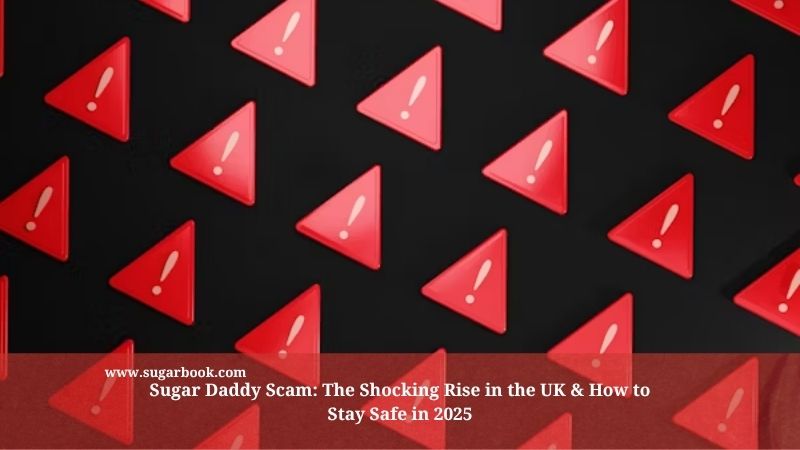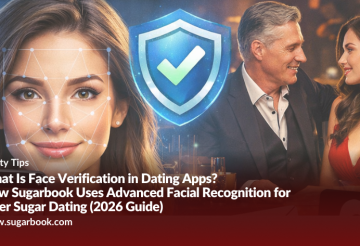
Meet successful sugar daddies and confident sugar babies on the world’s leading sugar dating app. Join free today.
Contents
Why the sugar daddy scam is rising fast in the UK
In 2025, more people in the UK are searching for the term sugar daddy scam than ever before – and there’s a worrying reason behind it. The sugar daddy scam isn’t new, but its scale, sophistication, and emotional cost are growing rapidly, especially among students, single parents, and even older adults looking for companionship.
One reason the sugar daddy scam is becoming more common in the UK is the popularity of social media platforms like Instagram, TikTok, and Snapchat. Scammers now reach out directly through DMs, posing as generous sugar daddies offering weekly allowances, luxury gifts, or help with bills. The idea of easy money and glamorous perks draws people in, especially with the UK’s rising living costs.
Another factor is the rise of dating apps and sugar dating platforms. While many users on these apps are genuine, scammers blend in easily, using fake photos and convincing profiles. Once trust is built, they ask victims to pay fake “transfer fees,” buy gift cards, or share sensitive personal details.
In the UK, reports of the sugar daddy scam are growing in cities like London, Manchester, Birmingham and Edinburgh. Victims often feel embarrassed, so actual numbers are likely higher. The sugar daddy scam doesn’t just cause financial loss; it also leaves victims feeling hurt, humiliated, and less likely to trust genuine connections in the future.
With thousands now searching for sugar daddy scam prevention tips online, it’s clear this issue isn’t going away soon.
Common red flags that signal a sugar daddy scam
If you want to avoid falling victim to a sugar daddy scam, knowing the warning signs is key. Here are the red flags UK victims and experts say are most common in 2025.
1. Quick promises of big money
A classic sugar daddy scam begins with grand promises: “I’ll pay you £500 a week just for chatting” or “I’ll transfer £2,000 to help with your rent.” Real sugar daddies typically build trust first, and genuine arrangements rarely start with huge sums upfront.
2. Asking for fees, gift cards or transfers
The sugar daddy scam often involves fake “release fees,” “payment processing fees,” or requests to buy Amazon or Steam gift cards. Once the victim sends money or codes, the scammer disappears — or keeps asking for more.
3. Avoiding video calls
If someone claiming to be a sugar daddy won’t video chat or keeps making excuses, it’s a common sign of a sugar daddy scam. Scammers often steal photos or use AI-generated images.
4. Rushing the conversation
A sugar daddy scam usually starts with fast compliments and pressure: “I want to send money now, but I need your bank login,” or “Just send me £50 so I can unlock my bank.” Real sugar daddies won’t rush sensitive financial conversations.
5. Too good to be true
The sugar daddy scam plays on wishful thinking. If someone offers thousands just to “be my sugar baby” without meeting or even chatting properly, it’s almost always fake.
Recognising these signs is the first step to staying safe from the growing sugar daddy scam threat in the UK.
Real stories from UK victims of a sugar daddy scam
Understanding the impact of the sugar daddy scam means listening to real UK voices. Here are anonymised stories shared by victims to raise awareness.
“A man messaged me on Instagram, offering £300 a week just to chat. He said he needed me to pay a ‘£50 transfer fee’ first. I sent it, then he blocked me.” – Emily, 22, Manchester
“On a dating app, someone who seemed real offered to cover my bills. He asked for my bank details to ‘set up a standing order.’ Days later, my account was emptied.” – Liam, 27, London
“A sugar daddy messaged me during my uni finals, offering £500 as an ‘exam gift.’ He asked for gift card codes first. I sent £100 in codes before realising it was a sugar daddy scam.” – Priya, 21, Birmingham
These stories show the sugar daddy scam isn’t about greed; it often targets people under stress or looking for support.

Expert tips to avoid a sugar daddy scam in 2025
The best defence against the sugar daddy scam is knowledge and caution. Here are practical tips UK dating experts recommend for 2025.
1. Always verify identity
Before discussing money, ask for a short video call or live selfie. Scammers almost always refuse.
2. Never pay to get paid
A real sugar daddy won’t ask you to send money first. If someone claims you need to pay “fees,” it’s likely a sugar daddy scam.
3. Avoid sharing bank logins
Never give anyone your online banking password or full card details. Use secure payment apps with buyer protection if needed.
The sugar daddy scam often starts in Instagram or TikTok DMs. Treat anyone offering money there with suspicion.
5. Report and block
If you suspect a sugar daddy scam, block the user and report them to the platform.
6. Trust your instincts
If it feels rushed, over-generous or suspicious, it probably is.
By following these tips, UK singles can explore sugar dating while avoiding the pain of a sugar daddy scam.
Conclusion: the sugar daddy scam and staying safe in 2025
The sugar daddy scam isn’t about naivety – it preys on real financial stress, loneliness and hope. In the UK, thousands are targeted every year, and numbers keep rising.
By learning red flags, staying cautious online, and trusting your gut, you can avoid becoming part of sugar daddy scam statistics. And if it sounds too good to be true? It usually is.
FAQ
-
What is a sugar daddy scam in the UK?
It’s when someone pretends to be a sugar daddy but has no intention of offering support – often asking for fees, bank info, or photos first. -
How common are sugar daddy scams in 2025?
Sadly, they’ve increased. With more people online, scammers target sugar babies via social media, dating apps, and even fake payment links. -
How can I tell if a sugar daddy is fake?
If they ask for money upfront, rush you off the app, or promise large sums instantly – it’s likely a scam. Trust your instincts. -
Are verified sugar dating sites safer?
Yes. Platforms like Sugarbook offer profile verification, in-app messaging, and scam flagging – way safer than random DMs. -
What should I do if I’ve been scammed?
Block them immediately, report the account to the platform, and avoid sending any personal or financial info in future.
New to sugar dating? Learn how to get started safely.
Want to know what’s legit? Check real sugar daddy behavior in the UK.
Need platform reviews? See unfiltered reviews of sugar dating sites.
Prefer apps with safety tools? Try our Seeking Arrangements app comparison.
Want low-risk options? Explore apps that don’t require in-person meets.














